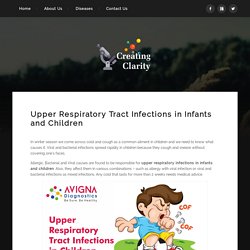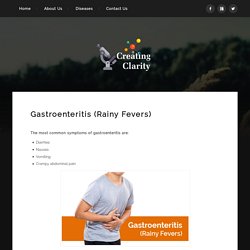

AvignaDiagnostics
Allergic, Bacterial and Viral causes are found to be responsible for upper respiratory infections in infants and children.
Immature Platelet Fraction (IPF) - A Prognostic Indicator of Platelet Recovery. Why Maternal & Newborn Thyroid Screen is Important? Types of Thyroid Hormones The thyroid secretes two hormones, tetraiodothyronine (T4) and triiodothyronine (T3).

Thyroid-stimulating hormone (TSH) stimulates the thyroid gland to produce thyroid hormones. TSH is produced by the anterior pituitary gland which in turn is stimulated by TRH which is produced by the hypothalamus. TSH in turn stimulates the thyroid follicular cells to release thyroid hormones. Thyroid hormones (T4 and T3) through negative feedback mechanisms regulating the release of TSH levels with high levels of T3/T4 decreased TSH and low levels of T3/T4 increasing TSH levels from the anterior pituitary.
Maternal Screening: Immature Platelet Fraction (IPF) - A Prognostic Indicator of Platelet Recovery. Avigna MultiSpeciality Clinics in Kukatpally(KPHB), Hyderabad. Avigna Multispecialty Clinics, a sister concern of Ankura Hospitals is a one-stop destination for all the everyday healthcare needs of the family.

We offer Consultations under 17 different Specialties, Diagnostics and Pharmacy, all under one roof. First of its kind in twin cities, the clinics aim to provide quick and hassle free access to wide ranging medical specialists avoiding long waits at hospitals. Access to the state-of-the-art diagnostic facilities under the same roof obviates having to go elsewhere for tests and diagnostics.
Upper Respiratory Tract Infections in Infants and Children. In winter season we come across cold and cough as a common ailment in children and we need to know what causes it.

Viral and bacterial infections spread rapidly in children because they cough and sneeze without covering one’s faces. Allergic, Bacterial and Viral causes are found to be responsible for upper respiratory infections in infants and children. Also, they affect them in various combinations – such as allergy with viral infection or viral and bacterial infections as mixed infections. Any cold that lasts for more than 2 weeks needs medical advice. How Does a Person Get The HIV Infection. The Effects Of HIV On The Body: Once the Human Immunodeficiency Virus (HIV) enters your body, it launches a direct attack on your immune system.

It gradually weakens your natural defenses against disease and infection and can affect every part of your body. Find out how. 1. Flu-like symptoms 2. Ulcers on lips, mouth,and tongue 3. What is HIV? How does a person get the HIV infection? Vitamin-D Test and Health Tips. Vitamin D is one of the important vitamins that our body needs and every cell in the body has receptors for Vitamin D.

Vitamin D is essential for healthy bones, teeth, cardiovascular system, skin and hair. It is also required for the integrity of the “Immune System”. Vitamin D is a Fat soluble vitamin and when taken in excess cannot be excreted through the kidneys like Vitamin C or Vitamin B-complex. Human skin is capable of forming Vitamin D when the skin is exposed to the sunlight (the UV rays) in fair complexioned people but it is not very effective in dark colored skin. Exposure to sunlight every day for 10- 15minutes is sufficient.
The adverse effects of Vitamin D – THE CONS Vitamin D may cause either Hyperglycaemia (High blood sugar) or Hypoglycaemia (Low blood sugar)Excess of Vitamin D will cause damage to the blood vessels, kidneys and other related health problems. How to know the Vitamin D levels in the body? Does the test for 25-OH vitamin D require any patient preparation? 1. The Most Common Symptoms of Gastroenteritis (Rainy Fevers) The most common symptoms of gastroenteritis are: DiarrheaNauseaVomitingCrampy abdominal pain Diagnosis:Gastroenteritis is often self-limiting, and the care is supportive – designed to control symptoms and prevent dehydration.

Tests may not be needed for healthy adults. In case of infants and elderly Gastroenteritis may be at times life threatening. Fever and persisting symptoms must make a person seek medical advice immediately. Causes: Viruses – Norovirus, Rotavirus, Adenoviruses, Parvoviruses, and Astroviruses.Bacterial infection – E. coli, Clostridium, Staphylococcus aureus and Salmonella.Protozoal infections from contaminated water – Giardia.Other conditions that may be the cause of the patient’s symptoms are appendicitis, gallstones, pancreatitis or diverticulitis. Laboratory Tests advised: Salmonella Food Poisoning Symptoms, Common Causes & Tests. Salmonella Food poisoning Salmonella infection causing food poisoning is very common especially in developing countries.

It is caused by a bacteria and infects humans when animal faeces contaminates the food or water through pets or through other means. The common causes of food poisoning is through: Undercooked chicken, eggs or other poultry and beefUnwashed fruits, vegetables or nutsUnpasteurized milkHandling food with unclean handsEating food with unwashed handsDrinking water contaminated with sewage water. Complications from This Diarrhea Are. In developing countries blood stained watery stools are often noted in children between the age of 6 months to 5 years.

It is also a frequent ailment in the elderly persons and people living in crowded places with poor sanitary conditions. This type of diarrhea is caused by a highly contagious bacteria through faeco-oral route. Handling food, milk or water without washing the hands with soap and eating food made from improperly washed vegetables are the source. The individual infected has bloody diarrhea, abdominal cramps, fever, joint pains, urge to pass stools and occasionally vomiting. Upper Respiratory Tract Infections in Infants and Children.